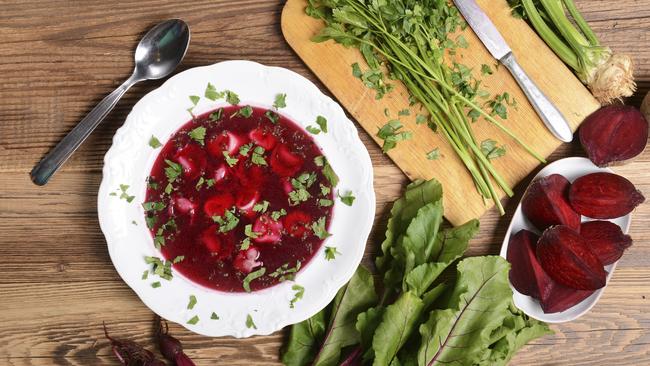The soup that unites Russians and Ukrainians even as they are at war
Borscht is the simple, unadorned meal that brings together Russians and Ukrainians who have moved to Istanbul to escape the conflict.

It took three attempts to find Irina Kaynatan’s place open, and when I did, the borscht had run out. “Borscht! They all want borscht!” she exclaimed, after disappointing a young couple in ripped jeans and rock T-shirts. “How can I have time to make it when I always have customers?”
I too had come for the borscht, but with the promise of vareniki – stuffed dumplings – my friends and I perched on stools at a tiny outside table and waited. Twenty minutes later it was served: unctuous parcels swimming in rich butter with a side of garlicky yoghurt.
Like the beetroot soup, vareniki is a staple of Slavic cuisine, which Kaynatan, originally from Yalta on the Crimean peninsula, serves up homemade in Izbuska, her cosy cafe in Istanbul. She has lived here for 15 years with her Turkish husband and previously worked as a Japanese teacher. She opened Izbuska in February, as émigrés from both Russia and Ukraine began flocking to Turkey after the invasion of Ukraine.
After a quiet few months, word spread and business picked up. Like many of her customers, Kaynatan’s family straddle the conflict, with relatives in Russia and Ukraine. Her cafe is focused on what unites the two: food.
“The problem is not between the people, it is about politics,” she said. “I try not to talk about it, because it is all for nothing. In Russia we have a saying: Wartime is for war, but lunchtime is for eating.”
Turkey ticks a lot of boxes for Russian visitors. It has not imposed sanctions and Turkish Airlines is still flying its routes there. Russians do not need a visa to enter and, until September, several Turkish banks still linked to Mir, the Kremlin’s version of Visa.
Back in February, the first exiles were mostly journalists, dissidents and tech professionals who found they could no longer connect with their online world as companies pulled their services out of Russia. Then, in September, the second wave came: young men fleeing Vladimir Putin’s draft. Flights to Turkey sold out for weeks, and many Russians spent thousands of dollars to get a seat. The oligarchs mooring their superyachts in Turkey’s marinas have grabbed the headlines, but the bulk of Russians who have fled to Turkey this year are young, and either apolitical or openly opposed to Putin’s regime.
Thousands of Ukrainians have come to Turkey too. While the atmosphere in Izbuska is cordial, elsewhere tensions are bubbling. In Antalya, a long-time favourite for tourists from both countries, the newcomers are snapping up houses – about $400,000 guarantees Turkish citizenship within months – and sending the local property market into overdrive. Some Ukrainians say they are uncomfortable sharing Antalya’s Orthodox Church with Russians.
In Istanbul, already a cultural melting pot, the Russian influx has brought a Slavic briskness to the alleyways of the inner city. Some 170,000 Russians have come to Istanbul since the start of this year, and September’s overall visitor numbers in the city were up 64 per cent.
Many have settled in fashionable waterside neighbourhoods that are home to a mix of foreigners. Pilates instructors are touring local gyms looking for job openings, and one dissident couple from St Petersburg have reopened the bookshop they were forced to leave when they fled Russia in February; they were targeted because they sold books by LGBT photographers. It is not the first time educated, dissident Russians have found a haven in Istanbul. In 1917, many of those fleeing the Bolshevik revolution settled in the city and contributed to the tapestry of its rich culture.
For now, the newcomers have been overwhelmingly welcomed, despite President Recep Tayyip Erdogan’s own crackdown on LGBT rights, and rising, hostile rhetoric against Syrian and Afghan refugees.
Kaynatan’s main concern is finding pork, an expensive rarity in a largely Muslim city. She used to get her own supplies from back home in Crimea before the war broke out.
I write down the directions to Istanbul’s sole Greek butcher, hidden away in an unassuming backstreet and a lifeline for foreigners, and she promises to cook it for me, Russian-style.
The Times



To join the conversation, please log in. Don't have an account? Register
Join the conversation, you are commenting as Logout